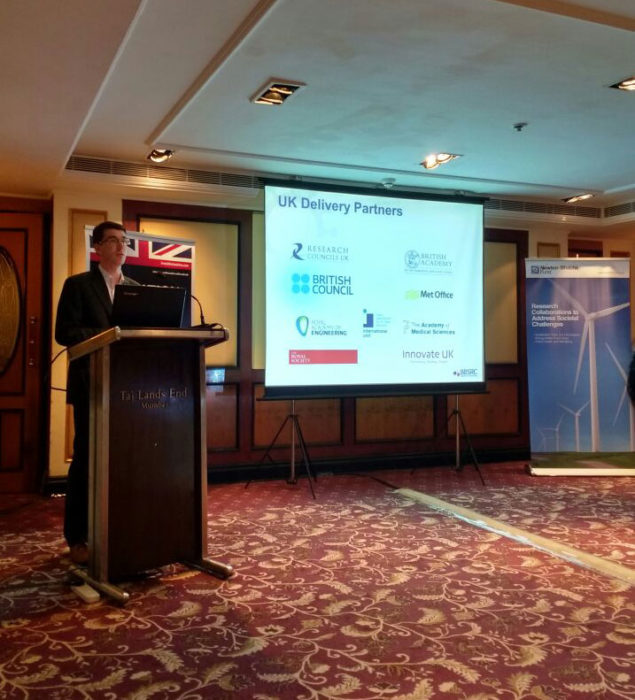28th September 2016 Mumbai, India
Potential UK-India collaborations on industrial biotechnology

Earlier this month, Dr Ian Stanton, Strategy and Policy Officer with the Biotechnology and Biological Sciences Research Council (BBSRC) participated in the UK-India workshops on industrial biotechnology in Mumbai and Chennai. In this blog, Ian outlines his thoughts on the future of UK-India collaborations on industrial biotechnology.
September saw my first visit to India for two workshops exploring the potential for UK-India collaboration on industrial biotechnology. Having not visited before, I was keen to see what opportunities there were for interactions between the UK and India, as the UK is increasingly outward facing in its approach to research. The UK’s status as a world leader in research has made it the partner of choice for countries looking to collaborate, and these workshops were developed to nurture the excellent links that already exist between the UK and India.
The two workshops held in Mumbai and Chennai (wonderfully organised by the Science and Innovation Network) brought together a delegation from the UK with Indian researchers, and focussed on topics such as bioenergy, biopharmaceuticals, and catalysis. There was a great deal of interesting discussion, and what especially struck me was the depth of enthusiasm from all attendees to use industrial biotechnology to solve some of the challenges faced by our countries, and the vast number of areas where there is potential to collaborate. From gas fermentation, to algal biofuels, to novel pharmaceuticals, the synergy between our two countries is very exciting to see.
A particular highlight for me was a tour of the DBT-ICT Centre for Energy Biosciences in Mumbai. The range of projects shows real promise in providing low carbon energy and dealing with pollution – they even have a system using algae to clean up waste water from the student dormitories! There were some incredibly useful links formed between my UK colleagues and researchers at ICT (as well as others at the workshops), and we are looking forward to the collaborations that will stem from these meetings. Certainly, the BBSRC and other UK Research Councils are very keen to support such collaborations, and have a number of schemes to facilitate interactions. It was very evident that there is potential within India and the UK to take basic research and accelerate those ideas through to industrial scale and deployment. That translation aspect to research is a key part of BBSRC’s delivery plan, and sits centrally within our strategy for industrial biotechnology.
We have worked hard in the UK to nurture our Industrial Biotechnology community, both within the academic sector and industry. In recent years, the BBSRC, together with the Engineering and Physical Sciences Research Council and Innovate UK, has invested over £100m in industrial biotechnology research. This has included a number of joint calls with India, and we are always keen to promote collaborations between the UK and the rest of the world. The BBSRC Networks in Industrial Biotechnology and Bioenergy covers the range of our Industrial Biotechnology remit, and exists to bring together academics, industrialists, and policy makers. The networks are free to join, and there are already several Indian researchers who are members – I’d encourage anyone interested in this area to take a look at them. The Newton-Bhabha fund has funded several collaborative projects, and there are more in development – all calls are published here. Alternatively, the RCUK office in New Delhi will be happy to help with any queries you may have.